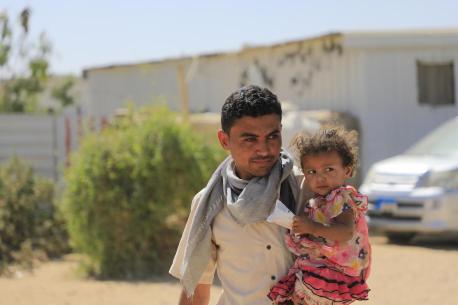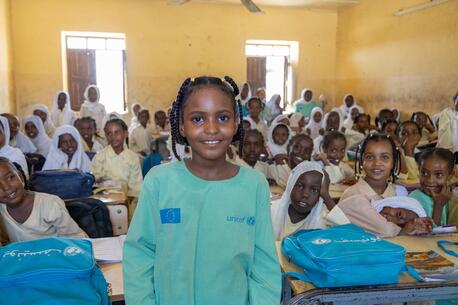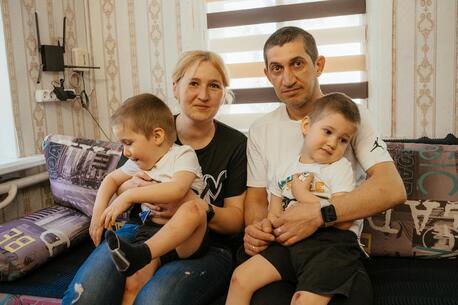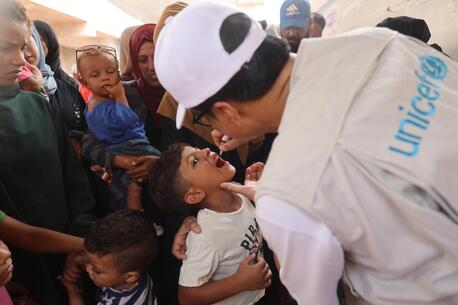
In Yemen, Each Ramadan Is Harder Than the Last
UNICEF helps struggling families make ends meet in war-torn Yemen.
More than 11,000 children have been killed or injured as a result of the conflict in Yemen, an average of four a day since escalated in March 2015. These are only the UN-verified accounts; the true toll of this protracted conflict is likely much higher.
All Yemen's children have been affected by what has become one of the world's largest humanitarian crises. Widespread economic collapse and overstretched national systems and services have left almost three-quarters of the total population, including 12.9 million children, in need of humanitarian assistance and protection.

Heavy fighting pushed Waleed Al-Ahdal, 25, and his family out of their home in Al-Hodeidah governorate in western Yemen. They came to Marib governate six years ago, and moved into a camp for the internally displaced in Al-Jufainah. The camp is the largest in the country, with 9,000 families.
"After the conflict broke out and the clashes intensified, I had no other choice but to escape death," he said. He and his wife are raising their four children in a tent. Living conditions are so harsh that he no longer thinks about preparing for the fasting month of Ramadan. "Ramadan has lost its shine; it has become just like any other month."

Back home, Ramadan festivities included "doing charity work, decorating the house and buying all the necessities," said Waleed, pictured above with Maymouna, 5, Hilalah, 6, Ghosoon, 2, and Khalid, 3, in 2022. "We used to start shopping for food two weeks before Ramadan began. But now, all days are the same for us. All we think about now is just to secure food for our children and ourselves, so we do not feel hungry all the time."

Rituals like gathering around the Iftar meal do not look the same as before. "We have no way to rejoice in the month of Ramadan," Waleed said sadly. "We are facing a difficult reality. I struggle to provide the basics for my family. All I can get is temporary daily work. Because of that, I am burdened with debts, and we find ourselves unable to afford three meals a day."

Rituals like gathering around the Iftar meal do not look the same as before. "We have no way to rejoice in the month of Ramadan," Waleed said sadly. "We are facing a difficult reality. I struggle to provide the basics for my family. All I can get is temporary daily work. Because of that, I am burdened with debts, and we find ourselves unable to afford three meals a day."

In 2022, Waleed's youngest daughter, 2-year-old Ghosoon, was diagnosed with severe acute malnutrition (SAM). Yemen's protracted crisis has left an estimated 2.2 million children acutely malnourished, including nearly 540,000 children under the age of 5 who are suffering from severe acute malnutrition (SAM), which can be fatal if not treated.

Ghosoon was referred to a nutrition center supported by UNICEF for treatment and nutritional supplements. Gradually, she regained her health.

UNICEF-supported mobile teams conduct regular visits to the camp to deliver integrated lifesaving nutrition services to children, including malnutrition screening and referral to nearby therapeutic feeding centers, where children and pregnant and lactating women are given Ready-to-Use Therapeutic Food (RUTF), therapeutic milks and antibiotics for the treatment of SAM, along with targeted supplemental feeding programs to prevent more children from dying of malnutrition.

UNICEF also provides humanitarian cash transfers, direct payments that families can use to meet their most pressing needs: food, medicine, school fees, warm blankets, clothes for their children. In 2022, almost 1.5 million households received emergency cash assistance every quarter, benefitting around 9 million people.

"Life in the camp is tragic," said Waleed. "We are threatened by the rain and the spread of diseases. We suffer from deprivation of everything. We have lost all means of livelihood." He dreams of the day he will be able to take his family back to his hometown, "to live in peace."
There is an urgent need for individuals, organizations and governments to come together and take action to help give children in Yemen and those struggling to survive around the world a safe and happy childhood.
HOW TO HELP
There are many ways to make a difference
War, famine, poverty, natural disasters — threats to the world's children keep coming. But UNICEF won't stop working to keep children healthy and safe.
UNICEF works in over 190 countries and territories — more places than any other children's organization. UNICEF has the world's largest humanitarian warehouse and, when disaster strikes, can get supplies almost anywhere within 72 hours. Constantly innovating, always advocating for a better world for children, UNICEF works to ensure that every child can grow up healthy, educated, protected and respected.
Would you like to help give all children the opportunity to reach their full potential? There are many ways to get involved.





